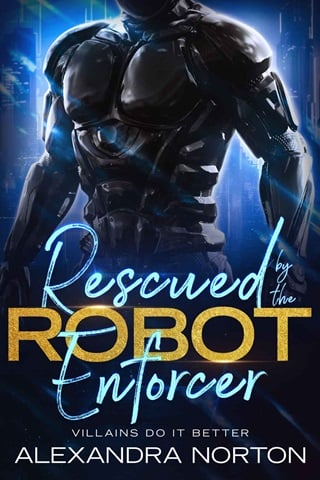10. Ansel
He let her drive with some hesitation. It would take time for his systems to recalibrate to the functional damage to his Secondary Subprocessing Unit, and he did not trust his own reliability while certain tasks were offloaded to backup processes.
The car screeched as Tisha drove carelessly from the parking lot—something Ansel would have been able to perform more safely, but the urgency was warranted nonetheless, so he did not comment.
When they were out on the street, she looked over at him, the beads in her hair clinking with the motion. Her thumb drummed the steering wheel.
“So listen. I know you’re gonna tell us to go to?—”
“Take the freeway north.”
“Wait, north north?” Her brows shot up as she gunned it through a yellow light.
“Out of the city. How much charge do we have?”
“Enough for a few days.” She glanced at the dash behind the wheel.
Ansel nodded and hunched over in his seat as the inner fibers holding together his components wove into a protective matrix beneath his damaged shell.
She had been planning to hamper him with an EMP transmitter. He’d gathered that when the device flew out of her pocket back at the building, during the attack. His integrated Faraday Cage would have made the attempt ineffective, of course.
“You should have left.” Ansel glanced at the rearview camera, watching for any sign of pursuit. “You wasted valuable time.”
“Yeah, well, I couldn’t.” Tisha stared at the road, taking the next turn onto the freeway on-ramp. She did not look happy about it, which mirrored his own sentiment.
Ansel studied the hard set of her expression. They would have to talk about this eventually, as much as he would rather not. But for now, he needed to get her to safety.
Ansel withdrew into himself, redirecting power only to his sentinel array, the SSPU recalibration, and the plotting of a safe route.
She followed his driving instructions with minimal protest, save for insisting on two rest stops to address her bodily concerns. For some reason, humans were averse to urinating in a container, regardless of increased efficiency and safety considerations.
Ansel had been pinged several times. Something tugged at him. A remote instruction triggered and abandoned here, a snippet of a download there.
He could not stop them all, but he could tighten his firewall and throttle packets as best he could while his SSPU stabilized and rerouted. He realized in the back of his primary neurosynth processing unit that the SSPU’s damage had fractured something in the deeper layers of his underlying core. His systems could not yet identify it, but he had long since identified one thing: the shooter who had targeted Tisha Varda.
* * *
They drove well past nightfall. For forty-eight-point-two miles they’d been following a narrow gravel path through a replanted forest that had been left to its own devices for long enough to overgrow, a monument to the chlorophyll era.
Tisha rolled down her window and took a long, deep breath.
“What are you doing?” Ansel asked.
“It smells different out here,” she said, sighing slowly as they followed the path, headlights illuminating rocks and patches of grass under the bumpy wheels.
Ansel lowered his own window and tuned his olfactory sensors. The results took him aback. The metallic smell of carbon capture emissions and the briny odors of the plankton farms were not entirely absent, but overshadowed by plant pheromones, terpenes, and decay. In place of dry heat roiling off asphalt, Ansel measured a humidity of ninety percent. Nighttime dew evaporated in summer’s smoldering heat.
The end path took them to the edge of a field grown over with six-foot-high grass, where they stopped. Tisha looked over at him. “Now what?”
“We walk.”
She sized him up, unconvinced. “Are you okay to do that? You could barely get up before.”
“My physical systems have recalibrated, and the protective matrix is reconstituted in the damaged area.”
Her eyes were swathed in shadows, but the orange and red output of the infrared feed he’d toggled revealed something like concern. “So you’re okay?”
He didn’t know what compelled him to bring his hand up to cup her small cheek in the darkness. Neither did she withdraw from the automatic gesture. But when his sensors met skin, his Integrated Tactile Response System produced feedback that resembled something like millions of microcurrent points firing along his spine. A sensation unlike anything he’d recognized since his construction, nor from the training data before his physical form had been manifested.
“I am okay,” he said quietly, the nano fibers enveloping the central power supply unit embedded in his chest constricting.
White teeth sank into the flesh of her bottom lip as she peered up at him, worried features relaxing. With a small nod, she powered off the car, plunging them into total darkness save for the sliver of moonlight peeking through the tree canopy.
“Okay.” She nodded in the shadows, warm skin shifting against his palm. “Let’s go.”
 Fullepub
Fullepub 



